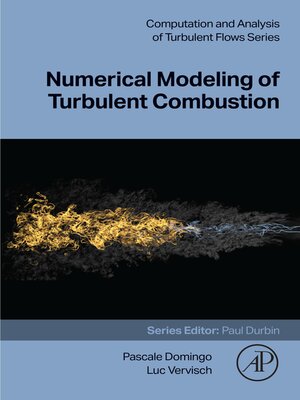Numerical Modeling of Turbulent Combustion
ebook ∣ Computation and Analysis of Turbulent Flows
By Luc Vervisch

Sign up to save your library
With an OverDrive account, you can save your favorite libraries for at-a-glance information about availability. Find out more about OverDrive accounts.
Find this title in Libby, the library reading app by OverDrive.



Search for a digital library with this title
Title found at these libraries:
| Library Name | Distance |
|---|---|
| Loading... |
Numerical Modeling of Turbulent Combustion provides readers with a comprehensive understanding of the specificities involved in numerical simulation of gaseous turbulent reactive flows and flames, including their most current applications. This title is intended for individuals with a background in fluid mechanics who are seeking to delve into the fundamentals of turbulent combustion modeling. It offers methodologies to simulate flames while taking into account their multi-physics character. Moreover, the text addresses emerging numerical technologies within this field and highlights the relevance of new sustainable fuels. The structure of the book is carefully organised to cover various aspects. It begins with an exploration of the fundamentals of aerothermochemistry, presenting key quantities and their corresponding balance equations that require numerical solutions. The book then delves into the essential concepts and tools necessary to handle the strongly non-linear nature of turbulent flames, with a specific focus on the interplay between turbulence and chemistry. Furthermore, readers will gain insights into the numerical modeling of flames within the context of sustainable combustion. This includes the introduction of novel fuels, such as hydrogen and solid metals, which have become increasingly relevant in recent times. The book also takes into account cutting-edge techniques, like the systematic integration of machine learning in numerical simulations of complex systems and the lattice Boltzmann approach. These innovations open new possibilities for tackling challenges in numerical turbulent combustion research. Both the fundamental methods and modeling tools are presented in detail, along with best practice guidelines for their practical application in simulations. This ensures that readers not only grasp the underlying theories but also gain valuable insights into how to implement these techniques effectively. Overall, Numerical Turbulent Combustion serves as a valuable resource for researchers and practitioners alike, offering a comprehensive and up-to-date understanding of numerical simulations in the field of turbulent combustion.
- Offers a comprehensive and balanced approach by addressing the problem both theoretically and practically
- Provides a consistent and in-depth exploration of flames and turbulent combustion
- Highlights the most current and crucial applications, with a particular emphasis on fostering a fundamental understanding and emerging technologies







